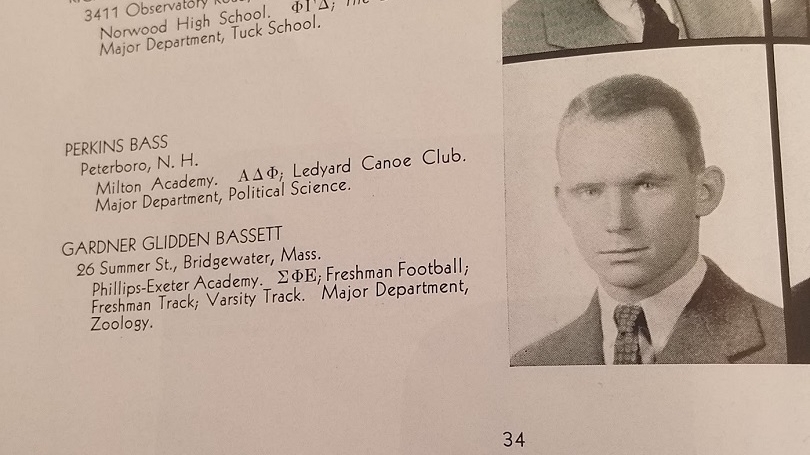
- Public Policy
- Leadership
- Funding
- News & Events
- About the Center
Back to Top Nav
Back to Top Nav
Back to Top Nav
Back to Top Nav
This article is part of a series of articles honoring Dartmouth Alumni who have served in public office and demonstrated their commitment to the ideals of public service, leadership, and civic engagement.
The first time I encountered the Perkins Bass name was in the library, on a poster advertising an event featuring Kelly Ayotte, a former Senator and attorney general for New Hampshire. I didn’t think much of it until I started doing research for the Public Service Legacy Project a few months later, when the pieces of the Bass story of public service began to click together.
Perkins Bass ’34 arrived on Dartmouth’s campus in the fall of 1930, just a few months after Nelson A. Rockefeller ’30 had graduated that spring. Dartmouth in the 1930s was decidedly different than it is today: it was still an all-male college, the era of prohibition in America was waning, J-bar lifts were used to get skiers to the top of snowy hills, and elaborate winter carnival sculptures were etched in front of fraternity houses instead of on the Green. The president of the College at the time, Ernest M. Hopkins, had made the difficult decision to abolish compulsory chapel attendance just a few years before.
As I flipped through several black and white yearbooks, the portraits of Perkins posing for his official photographs exuded a manner of seriousness and professionalism. Yet, Perkins also appeared to have a love for fun and thrills. During his undergraduate years, he was a member of Alpha Delta Phi and the Ledyard Canoe Club. In a telephone interview with his son Charlie Bass ’74, I also discovered that Perkins “spent an enormous amount of time playing bridge, the card game, for money.” According to his son, bridge proved to be a popular pastime among many Dartmouth men during Perkins’ era.
After he graduated with a degree in Political Science, Perkins attended Harvard Law and soon after became a founding partner of the Sheehan, Phinney, Bass & Green law firm, which still exists today. His two-and-a-half decades of public service began in 1939, when he was elected to the New Hampshire General Court. Over the next decade, Perkins continued to serve his home state, eventually becoming the President of the New Hampshire State Senate. After that, he was the Chairman of the Ways and Means Committee for the state for a year before he campaigned and was elected to Congress in 1954.
To put his national political career, which spanned from 1954 until 1963, into context, we must first contextualize the American political landscape at that time. The 50s and 60s were the height of the Cold War and the Civil Rights Movement. Bass was in office under the Eisenhower and Kennedy administrations, a period in which many government leaders had fought in World War 2. In the mid-1950s, middle class America expanded, as well as the prevalence of unions and moderation. The Red Scare was felt across the country, and as a result, leftist extremism was condemned.
As a “moderate Republican” representative for New Hampshire’s 2nd district, Bass cared deeply about his constituents’ concerns. He made sure to communicate with the people he represented. I read through a congressional report he mailed out summarizing the activities of Congress as well as polls asking about pertinent topics including nuclear war, Social Security, and using federal funds to raise teachers’ wages. It is clear Perkins wanted to make sure his constituents were well-informed and that he was open to hearing their opinions and concerns.
Bass comes from a lineage of public service: his father, Robert P. Bass, was a New Hampshire governor, and his grandfather, also named Perkins Bass, was Abraham Lincoln’s campaign manager for Illinois and later U.S. Attorney. His son, Charlie Bass, Class of 1974, also served New Hampshire’s second district in the House of Representatives forty years after he did. I think Perkins Bass exemplifies what a good public servant is supposed to do: serve as an honest liaison between the government and his constituents. Bass passed away in 2011, but his legacy continues to impact the Dartmouth community and beyond. At Dartmouth, the Perkins Bass Distinguished Visitors and Funded Intern programs commemorate his political career as they enable students to engage with prominent New Hampshire public servants and experience local policymaking first-hand through internships.
Written by Valerie H. Truong ’21, Student Researcher for the Dartmouth College Public Service Legacy Project.